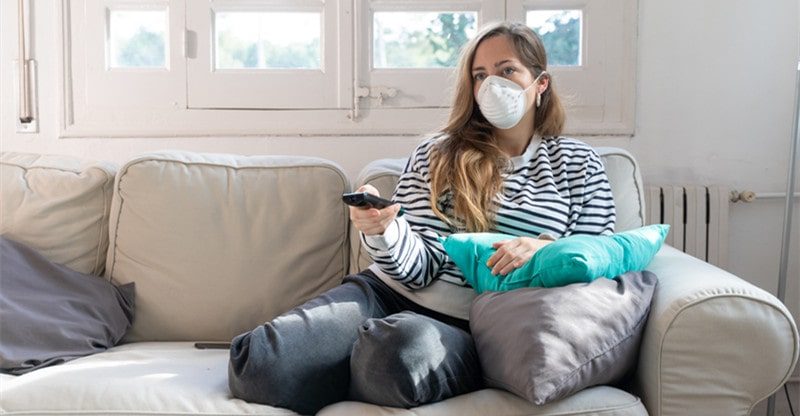How To Shelter In Place During A Pandemic
The sudden onset of the novel Coronavirus/COVID-19 has led to repercussions whose ripples have already been felt by many citizens across the country. As cases of confirmed infections and related deaths continue to rise, people are finally being ordered to shelter in place.
If you’re unfamiliar with the term, or you haven’t heard the ordinances that have been set in place by your state government, a shelter in place order states that you should remain in your home at all times, with the exception of reasons that are deemed “essential.” If you’re sheltering in place, and at all times frankly, you should make sure your home is stocked with emergency essentials.
But what falls under the umbrella of essential needs? How is that determined?
The specifics behind shelter in place orders are decided by the state. For this reason, you should familiarize yourself with the shelter in place orders designated by the state government. However, let’s take a closer look at what is usually covered under such an ordinance, from how it can affect your life to what you should be doing to abide by it.
Essential and Non-Essential Businesses, Tasks, and More
Shelter in place laws often distinguish between businesses that are considered essential and those that are non-essential. Furthermore, laws will make distinctions between activities and functions of life that are considered to be essential and non-essential while a shelter in place ordinance is in effect.
Unsure of how this affects your normal day-to-day life? Here are distinctions often made by your local governments, who will decide what businesses provide emergency essentials and needs to the public.
Essential activities
You shouldn’t be leaving your home unless you necessarily have to. These are the following activities and fundamental needs of life covered, which you are allowed to do. None of these should be abused, though—it is in your best interest to shelter in place as much as possible.
• You are allowed to leave the home for running essential errands for yourself, family, or elderly and disabled folks. These errands include going grocery shopping, buying necessary supplies related to cleaning and maintenance, and getting pet food.
• Any task related to maintaining personal health and safety is okay, whether you need to go to the pharmacy to get your monthly medication, see your primary care physician, or go to the ER.
• You may leave your home to care for individuals dependent on you, whether that be a minor, a person living with a disability, or an elderly family member.
• It is alright to go outside to engage in outdoor activities such as hiking, running, biking, and walking. However, you should keep your distance between yourself and others—the common recommendation is to maintain at least 6 feet of social distancing.
Businesses that are open
• Human services, such as the DHS, DCFS, and Medicaid offices will tend to be open, as people rely on these services to live each day. Similar facilities include care facilities, senior homes, drug-and-alcohol rehabilitation facilities, social services offices, food assistance centers, and homeless shelters.
• Healthcare and public health facilities will also be open while a shelter in place order is in effect. Medical treatment, physical and mental, is considered essential, especially when the shelter in place order started due to a pandemic such as COVID-19.
However, the healthcare services open at this time depend on the state and business: while most ERs and urgent care facilities will be open, offices for dentists, medical cannabis, and mental health might be closed, especially while the crisis is at its peak.
• Governmental infrastructure organizations and businesses will still be open over the course of the crisis, including solid waste management, internet providers, highway maintenance crews, and professionals that work for water, sewer, gas, and electrical organizations.
• Stores that provide emergency essentials such as water, food, medicine, and first aid supplies — e.g. Grocery stores — will remain open over the course of the crisis, as the goods they provide are essential for human health and safety.
• Mail and delivery systems.
• Restaurants, although they are likely to be forced to move into a “dine-out only” method of production and service.
• Media organizations are likely to remain open, but they might transfer to remote-work options.
• Financial institutions.
• Supplies to work from home.
• Transportation services.
• Residential services and home care services.
• Manufacturing industries, dependent on employer and supply-and-demand effects.
What are non-essential businesses?
What makes a business non-essential at this time, though? In all honesty, the most common factor which makes this decision is whether the business is centered around entertainment and social gathering. Businesses expected to be closed during a shelter in place order include the following:
• Bars and nightclubs
• Sports arenas and convention centers
• Entertainment (music and theater) venues
• Restaurants that do not have dine-out options
• Gyms
• Playgrounds
• Public parks, depending on their size
• Pre-planned public events, such as conferences and business meetings
• Some states will also close down childcare services if the number of children they are caring for exceeds a certain number
What are you allowed to do during a shelter in place?
So you’ve properly sheltered yourself at home. What do you do now? What can you do, and where do you go from here?
As said earlier, there are certain essential tasks you’re allowed to do. You can go …
• To the grocery store
• To the hardware store
• To the doctor
• To an elderly relative’s home, only if you’re caring for them
• Outside for a walk, run, or bike ride, as long as you maintain six feet of distance between yourself and others
But what else is there to do? There are productive tasks you take upon yourself to ensure you and your family remain safe while sheltered in place. Consider the following:
• Stock up on food when grocery shopping to lessen your trips outside. If possible, considering ordering emergency essentials such as dehydrated survival food kits, which will provide you and your family with months of food.
• Perform any maintenance that is needed around your home to ensure that your home does not undergo sudden structural issues if the crisis at-hand happens to get worse.
Sheltering in place can be difficult, both physically and mentally. Make sure to continue to eat healthy foods and get as much exercise as possible during this drastic change in everybody’s daily life.



